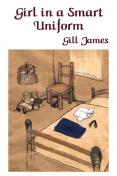
LitPick Review
In 1930’s Germany, Gisela joins the Bund Deutsche Madel, or the BDM (The League of German Girls). At first she enjoys being a member, but after awhile, she begins to question their tactics and policies. When people around her and eventually she herself become potential targets, she sees Hitler and the Nazi Party for the evil that they really are.
Opinion:
It's important to know why and how a person would become part of a truly evil and cruel group and contribute to actions that further that group’s agenda. Everyone is susceptible to groupthink and propaganda. Girl in a Smart Uniform shows how easily a person with good intentions and ideals could fall into that situation and become an active participant. Only when it's almost too late do they realize that they gave up their conscience, free will, and soul.
Gisela is that type of character. She is far from likable, but her journey from ignorance, to participant, to empathy, to self awareness is an interesting one. She begins as someone who is trying to get away from her narcissistic mother, abusive stepfather, and bullying brother. Gisela needs some kind of structure and purpose in her life and in her mind, BDM provides that. She also feels a sense of purpose and belonging after she joins. She has close friends whom she accompanies to meetings and outings. She likes the smart uniforms and the volunteer work. She even ascends to regional leader in the organization. If she starts to feel remorseful about the way Jews and other people are treated under Hitler's reign, she silences that conscience with a jingoistic reminder that could be right at home in one of Leni Riefenstahl’s films.
Gisela becomes harder to like when she sinks into the Nazi mindset and even her narration becomes militant, arrogant, and antisemitic. At times she is so willfully ignorant and delusional that readers might want to reach through the pages and slap her to make her see reality. While she is marching and wearing a nice uniform, millions of people are forcefully led to their deaths and for a long time she chooses not to see that.
Gisela’s redemption could be seen as egocentric. Once Hitler’s policies start affecting her personally is when she starts taking notice and arguing against their behavior. But true conversion has to start somewhere and quite often it involves that person looking at how destructive their path has become for themselves and the people around them.
There are three particular moments that transform Gisela’s role from participant in evil to a fighter against it. The first is the birth of her half-brother, Jens, who is born developmentally disabled. Her mother withdraws and her stepfather wants nothing to do with him leaving Gisela to take care of him often alone. Now she sees that those that the Nazis consider physically or mentally undesirable have a human face and she can't reconcile that rhetoric with her love for Jens, a boy whom she has grown to love for himself.
The second is the realization that those closest to her like her oldest brother and a schoolmate are helping Jewish people. This also comes with learning that some like a close friend are Jewish in their lineage. First she does the old “well they don't act like the others” hollow excuse that anyone could see through once they stop looking at manufactured stereotypes. She looks beyond the forced stereotypes and sees the Jewish people as fellow human beings. It becomes harder to believe the lies that she forced herself to. Gisela also sees the real suffering that the people that she once thought of as brave and noble are the worst kind of monsters and are inflicting pain on others just because they worship in a synagogue rather than a church. She realizes that while she is playing soldier and propping up an Aryan ideal that never truly existed and is causing great damage, real heroes are taking real action to rescue and help others escape from this tyranny that she espoused.
The final moment is more personal for Gisela. It's her growing awareness of her love for other women. She has an early relationship with Rosalinde, a BDM leader who helps Gisela define and identify her lesbianism. However, her sexuality is more deeply explored with Trudi, another BDM member with whom she builds a secret relationship. Gisela and Trudi realize that their affection is considered illegal and if caught they could be sentenced to a concentration camp. They know that their relationship flies into the face of the Nazi ideal of what a traditional woman should be like (“Kinder, Kitche, Kurche”-”Children, Kitchen, Church.”) But with each other they are able to be honest, share thoughts and emotions as well as their bodies, and be their real authentic selves together. Gisela’s love for Trudi is what finally pulls her from embracing Authoritarianism and Fascism to embracing Democracy and Freedom. She finally is able to take action, help others, and free herself.
Girl in a Smart Uniform is a stirring tale of how someone can stumble into hate groups and their propaganda. But it is also a compelling heroic journey about someone finding the inner strength and character to get out.


